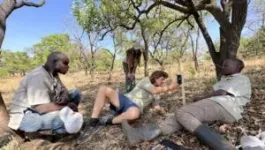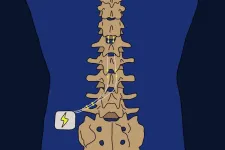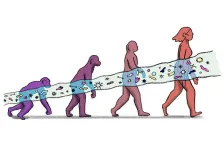(Press-News.org) A group of scientists, including researchers from Rutgers University-New Brunswick, Princeton University and Carleton University, has questioned the accuracy and utility of the metaphor “tipping point” in calling attention to the threat of climate change.
The phrase, while perhaps initially useful as a clarion call that warns about sudden, drastic changes, may now be confusing the public and impeding action, researchers said.
Writing a perspective in Nature Climate Change, the scientists, from the Rutgers Climate and Energy Institute, Princeton’s Center for Policy Research on Energy and the Environment, and Climate Resilient Societies through Equitable Transformations (ReSET) Lab at Carleton University as well as six other academic institutions, argue that the notion of tipping points, when referencing physical and human aspects of the Earth’s changing climate, is not well-defined and often applied inappropriately. There also is no evidence, they said, that the apocalyptic tone of the phrasing is driving action.
The researchers said the public is more likely to respond to threats that are perceived as relatively certain, near-term and nearby than to what are viewed as abstract dangers, the timing of which are either highly uncertain or unpredictable.
“While many of the physical phenomena bundled under the ‘tipping points’ label are systemically important and well worth studying, the tipping-points framing does not necessarily highlight – and may obscure – their most critical or consequential aspects,” said Robert Kopp, the paper’s first author, a Distinguished Professor in the Department of Earth and Planetary Sciences at the Rutgers School of Arts and Sciences, and a Visiting Fellow at the Princeton School of Public and International Affairs.
Social science research, the authors said, indicates that constructive collective action is more likely to be inspired by identifiable “focusing events” tied to climate change – such as widespread wildfires, protracted drought and intense heat waves and flooding – than by the more abstract and loosely applied notion of climate tipping points.
The phrase "tipping point" is a metaphor that describes a critical point in any system when a small change leads to a significant and often irreversible larger-scale change. An event occurs, a threshold is crossed and a system reorganizes and doesn’t return to its original state. In climate science, the United Nations Intergovernmental Panel on Climate Change uses the term to refer to “critical threshold[s] beyond which a system reorganises, often abruptly and/or irreversibly.”
The expression, Kopp said, entered widespread use in popular culture in the early 2000s with the popularity of Malcolm Gladwell’s bestselling The Tipping Point: How Little Things Can Make a Big Difference. Gladwell, a New Yorker writer, defined a tipping point as "the moment of critical mass, the threshold, the boiling point” and applied it as a principle underlying several sociological trends, from the rise in popularity of Hush Puppies shoes to steep declines in crime rates.
In subsequent years, climate scientists adapted the term to apply to phenomena such as the potential collapse of the Atlantic Meridional Overturning Circulation, the West Antarctic Ice Sheet and coral reef ecosystems.
“Tipping points” and their multiple uses in science and beyond aren’t well defined and provide an illusion of precise scientific understanding, the authors said.
“Attempts to subsume so many issues and behaviors under the same label and common interpretive framework do not advance science,” said co-author Michael Oppenheimer, the Albert G. Milbank Professor of Geosciences at Princeton University.
As the use of “tipping points” has expanded to describe not only climatic events but social ones – ranging from social cohesion to food prices – its all-encompassing use has rendered it necessarily vague. This is not helpful toward inspiring action, the authors said.
“Democracies are more likely to act after collective recognition of an identifiable focusing event – like a destructive wildfire or disruptive energy fuel shortage –
that provide political openings for existing policy communities to advance recognized remedies,” said co-author Rachael Shwom, a professor in the Department of Human Ecology at the Rutgers School of Environmental and Biological Sciences.
Confusion may arise when discussions erroneously conflate temperature-based policy targets, such as the goal of not exceeding a global average temperature increase, with climate tipping points, the authors wrote. It would be a mistake to allow science to be wrongly perceived as identifying precise thresholds for catastrophic outcomes when the timing of such thresholds is deeply uncertain. This could lead to a “false alarm” effect that may reduce the credibility of future claims should those catastrophic outcomes fail to occur when the anticipated thresholds are crossed, they said.
“Every fraction of a degree matters: 1.45°C is bad, and 1.55°C is worse,” said co-author Elisabeth Gilmore, an associate professor of environmental engineering at Carleton University, a visiting professor at the Rutgers Bloustein School of Planning & Public Policy and corresponding author on this manuscript. “Yet many in the media and the public appear to think that 1.50°C is of special physical significance or a threshold after which climate mitigation is not worth undertaking. Quite the opposite is the case: the warmer Earth becomes, the greater the need to promptly reduce emissions and expand efforts to build resilience and adapt to a hotter planet.”
The scientists said they aren’t the first to raise concerns about employing “tipping point” in public discourse about climate change. In 2006, in the midst of an initial surge of popularity surrounding the phrase, editorial writers at Nature critiqued the phrase in an essay for its overemphasis on deeply uncertain science and the risk that such a focus could lead to fatalism.
“Scientific framings that are intended to be policy-relevant ought to be subject to scientific scrutiny,” Gilmore said. “To the extent scientists continue to talk about tipping points, the communicative effects of that framing should be a topic of research.”
Regardless of the threat of tipping points, climate change is already causing demonstrable and obvious harm around the world, said Kopp, who also is director of the Megalopolitan Coastal Transformation Hub, a 13-institution National Science Foundation-funded consortium that includes Rutgers, Princeton, and Carleton. “The obvious cost in lives and property damage is enough to justify much more aggressive action by countries worldwide,” Kopp said.
END
Scientists question the use of “tipping point” metaphor in climate change discussions
The concept may be confusing the public and inhibiting action, researchers say
2024-12-03
ELSE PRESS RELEASES FROM THIS DATE:
Ecosystems: New study questions common assumption about biodiversity
2024-12-03
Plant species can fulfil different functions within an ecosystem, even if they are closely related to each other. This surprising conclusion was reached by a global analysis of around 1.7 million datasets on plant communities. The study was led by Martin Luther University Halle-Wittenberg (MLU) and the University of Bologna. Their findings overturn previous assumptions in ecology. The study was published in "Nature Ecology & Evolution" and offers insights for nature conservation.
When ...
DNA secreted by tumor cell extracellular vesicles prompts anti-metastatic immune response
2024-12-03
Specially packaged DNA secreted by tumor cells can trigger an immune response that inhibits the metastatic spread of the tumor to the liver, according to a study led by researchers at Weill Cornell Medicine, Memorial Sloan Kettering Cancer Center and Korea’s Yonsei University. The discovery improves the scientific understanding of cancer progression and anticancer immunity, and could yield new clinical tools for assessing and reducing metastasis risk.
In the study, reported Dec. 3 in Nature Cancer, the researchers examined cancer cells’ secretion of short stretches of DNA packaged on tiny capsules called extracellular ...
Countdown to an ice-free Arctic: New research warns of accelerated timelines
2024-12-03
The first summer on record that melts practically all of the Arctic’s sea ice, an ominous milestone for the planet, could occur as early as 2027.
For the first time, an international research team, including University of Colorado Boulder climatologist Alexandra Jahn and Céline Heuzé from the University of Gothenburg in Sweden, used computer models to predict when the first ice-free day could occur in the northernmost ocean. An ice-free Arctic could significantly impact the ecosystem and Earth’s climate by changing weather patterns.
“The first ice-free day in the Arctic won’t change things dramatically,” ...
Survey reveals grim state of Uganda’s lions, leopards, and hyenas
2024-12-03
Lion numbers in the country are at a critical low while hyenas are faring well across four major protected areas in Uganda, according to new survey findings co-led by Griffith University, Southern University of Science and Technology (China) and Northern Arizona University.
Researchers unveiled the first comprehensive population estimate of Uganda’s lions, leopards, and spotted hyenas in nearly two decades.
Conducted across six major protected areas – including the 4000 km2 Murchison Falls and the 2400 km2 Queen Elizabeth Conservation Area – this innovative study was a collaborative ...
The genetic roots of rare mutations in Alzheimer’s disease
2024-12-03
Leuven, 3 December 2024 – Alzheimer’s disease is a debilitating condition that slowly robs people of their memory and cognitive abilities, affecting millions of people worldwide. Familial Alzheimer’s disease (FAD), a rare inherited form of the disease, is linked to mutations in several genes, including APP, PSEN1, and PSEN2. The impact of PSEN2 mutations has remained less understood—until now. A research team led by Prof. Wim Annaert at VIB-KU Leuven has shed light on how mutated PSEN2 accelerates disease ...
Brain scan predicts effectiveness of spinal cord surgery
2024-12-03
A 10-minute brain scan can predict the effectiveness of a risky spinal surgery to alleviate intractable pain. The Kobe University result gives doctors a much-needed biomarker to discuss with patients considering spinal cord stimulation.
For patients with chronic pain that cannot be cured in any other way, a surgical procedure called “spinal cord stimulation” is seen as a method of last resort. The treatment works by implanting leads into the spine of patients and electrically stimulating the spinal cord. Because the spinal cord transmits sensations to the brain from all over the body, the position ...
Cognitive ability and physical health predict dementia later in life
2024-12-03
The risk of developing dementia later in life is strongly predicted by a person’s cognitive ability, functional limitations and physical health as many as 20 years before onset of the illness, according to a new RAND report.
Related new research found that early detection of cognitive impairment helps people to take mitigating actions to prepare for future loss of financial and physical independence.
While older adults’ take-up of cognitive testing currently is low, additional research found that use of cognitive tests would increase if it was free and readily accessible, ...
New survey finds 56% say ‘alone time’ is vital to their mental health
2024-12-03
COLUMBUS, Ohio – Some say the holidays are the most wonderful time of the year. But for others, the hectic holiday season may be the most stressful.
A new national survey of 1,000 Americans commissioned by The Ohio State University Wexner Medical Center and College of Medicine shows that 46% of Americans say they don’t get the alone time they need during the holidays.
In addition, 56% of survey respondents say that it’s very important to their mental health to have adequate alone time.
Sophie Lazarus, PhD, a clinical psychologist in the Department of Psychiatry and Behavioral Health at Ohio State, says in ...
How did human brains get so big? The answer could be in our gut
2024-12-03
How did human brains get so big? The answer could be in our gut
Microbes supporting the production of more metabolic energy could be key to the evolution of large brains
First study to show gut microbes from different animal species shape variations in their biology
Offers new take on human evolution, particularly the evolution of our large brains
Mice with large-brain primate microbes eat more, but grew slower and put on less body fat
Their bodies use the excess energy to produce high levels of glucose, which is the brain’s primary ...
Evaluation of the phytochemical and medicinal value of lemongrass (Cymbopogon citratus), by conversion into powders and extracts to develop a nutritional bakery product
2024-12-03
Background and objectives
Because of its extraordinary phytomedicinal potential and numerous potential health benefits, lemongrass (Cymbopogon citratus), a well-known medicinal and aromatic plant, is of paramount significance. It is typically used as a drug replacement.
Methods
The present study was comprised of drying lemongrass into powder and determining the proximate and mineral composition, and then developing ethanolic extracts of powder to determine total phenolic contents (TPC), total flavonoid contents (TFC), total carotenoids (TC), and DPPH free radical scavenging activity. Next, lemongrass powder (LGP) was replaced at 0, 2.5, 5, 7.5, and 10% levels ...
LAST 30 PRESS RELEASES:
Justice after trauma? Race, red tape keep sexual assault victims from compensation
Columbia researchers awarded ARPA-H funding to speed diagnosis of lymphatic disorders
James R. Downing, MD, to step down as president and CEO of St. Jude Children’s Research Hospital in late 2026
A remote-controlled CAR-T for safer immunotherapy
UT College of Veterinary Medicine dean elected Fellow of the American Academy of Microbiology
AERA selects 34 exemplary scholars as 2026 Fellows
Similar kinases play distinct roles in the brain
New research takes first step toward advance warnings of space weather
Scientists unlock a massive new ‘color palette’ for biomedical research by synthesizing non-natural amino acids
Brain cells drive endurance gains after exercise
Same-day hospital discharge is safe in selected patients after TAVI
Why do people living at high altitudes have better glucose control? The answer was in plain sight
Red blood cells soak up sugar at high altitude, protecting against diabetes
A new electrolyte points to stronger, safer batteries
Environment: Atmospheric pollution directly linked to rocket re-entry
Targeted radiation therapy improves quality of life outcomes for patients with multiple brain metastases
Cardiovascular events in women with prior cervical high-grade squamous intraepithelial lesion
Transplantation and employment earnings in kidney transplant recipients
Brain organoids can be trained to solve a goal-directed task
Treatment can protect extremely premature babies from lung disease
Roberto Morandotti wins prestigious Max Born Award for pioneering research in quantum photonics
Scientists map brain's blood pressure control center
Acute coronary events registry provides insights into sex-specific differences
Bar-Ilan University and NVIDIA researchers improve AI’s ability to understand spatial instructions
New single-cell transcriptomic clock reveals intrinsic and systemic T cell aging in COVID-19 and HIV
Smaller fish and changing food webs – even where species numbers stay the same
Missed opportunity to protect pregnant women and newborns: Study shows low vaccination rates among expectant mothers in Norway against COVID-19 and influenza
Emotional memory region of aged brain is sensitive to processed foods
Neighborhood factors may lead to increased COPD-related emergency department visits, hospitalizations
Food insecurity impacts employees’ productivity
[Press-News.org] Scientists question the use of “tipping point” metaphor in climate change discussionsThe concept may be confusing the public and inhibiting action, researchers say







